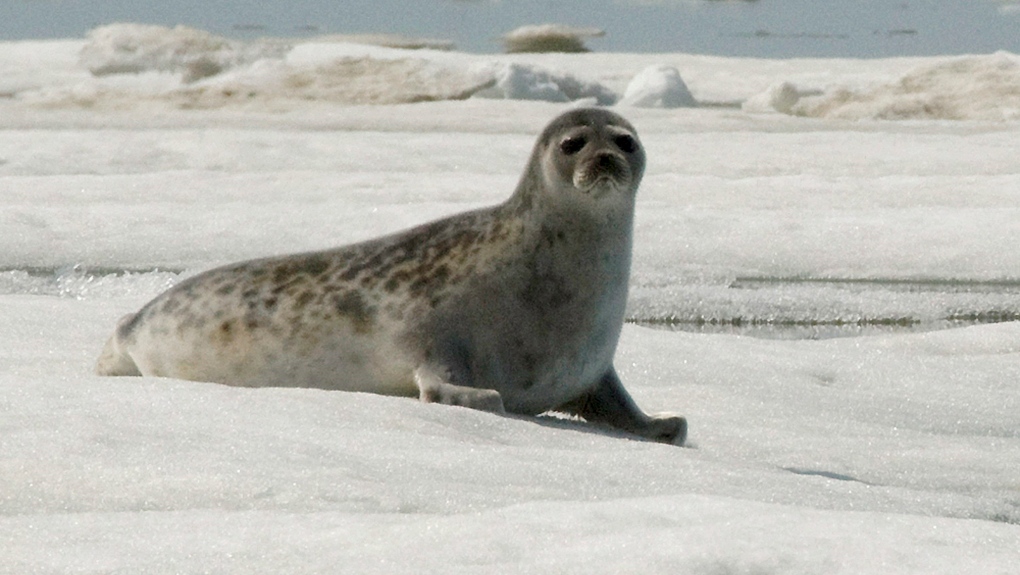Climate change could force Arctic seals to feed on 'marine junk food,' new B.C. study suggests
 FILE - This June 5, 2009 file photo released by National Oceanic and Atmospheric Administration shows an adult ringed seal in Kotzebue, Alaska. (THE CANADIAN PRESS/HO-Mike Cameron/NOAA via AP, File)
FILE - This June 5, 2009 file photo released by National Oceanic and Atmospheric Administration shows an adult ringed seal in Kotzebue, Alaska. (THE CANADIAN PRESS/HO-Mike Cameron/NOAA via AP, File)
The impacts of climate change could soon force some ocean predators in the Arctic to feed on what researchers are calling "marine junk food," a new study out of B.C. suggests.
The study, conducted at the University of British Columbia and released last week, found distribution of some fish species will speed up by 2025. Those changes will likely impact Arctic predators, like ringed seals.
"We found that by the end of the century, the large, fatty Arctic cod may decline dramatically in terms of biomass and distribution," said Katie Florko, a UBC PhD student at the Institute for the Oceans and Fisheries and the lead author of the study, in a news release.
"Then smaller fish, like capelin and sand lance, may become much more prevalent."
With warming waters in the Arctic, cod that live under sea ice are expected to move further north or become less abundant, the study says. However, capelin and sand lance are less sensitive to heat and may expand their territory.
The study also suggested many varieties of fish could also shrink in size.
In other words, Florko explained, while the number of fish might increase, they'll "come in smaller packages." As a result, Arctic predators like ringed seals will gain less food energy while foraging.
"It costs energy to forage. Does that mean the seals will need to spend more energy to get a larger number of these smaller fish for the same amount of energy as capturing a bigger fish?" Florko said.
"It's not unlike how the burgers in fast food restaurants seem to get smaller and smaller every year, and you’re getting less bang for your buck."
Complicating the situation, there could be some potential benefits to these changes. For beluga whales, capelin are a staple in their summer diet so their increase could be positive. However, the whales rely on eating Arctic cod to store body fat.
"We’re rolling the dice, and we don’t know what exactly will happen," said Travis Tai, a graduate of the IOF’s PhD program and co-author of the study, in the news release.
"When we have dramatic shifts in food web structures, we can expect large changes not only to how species such as ringed seals use the oceans, but also how people use the oceans."
CTVNews.ca Top Stories

New photos released of Luigi Mangione as prosecutors obtain arrest warrant for suspect in N.Y. shooting
Manhattan prosecutors have obtained a warrant for the arrest of Luigi Nicholas Mangione, the 26-year-old suspect in the brazen Manhattan killing of UnitedHealthcare's CEO.
'Governor Justin Trudeau': Trump appears to mock PM in social media post
Amid a looming tariff threat, U.S. president-elect Donald Trump appears to be mocking Prime Minister Justin Trudeau, referring to him as 'Governor Justin Trudeau' in a post on Truth Social early Tuesday.
Canada announces new sanctions against Chinese, Russian officials
Past and present senior Chinese officials, as well as Russian officials and collaborators, are the subjects of new human rights sanctions, the Canadian government said Tuesday.
'I never got the impression he would self-destruct:' Friends of suspect in fatal CEO shooting left in shock
Months before police identified Luigi Mangione as the man they suspect gunned down a top health insurance CEO and then seemingly vanished from Midtown Manhattan, another disappearing act worried his friends and family.
Google pulls McDonald's negative reviews over arrest in UnitedHealth murder
Google on Monday removed derogatory reviews about McDonald's MCD.N after the suspect in the killing of UnitedHealth executive Brian Thompson was arrested at its restaurant in Altoona, Pennsylvania, where police say a customer alerted a local employee about him.
Canadian man sentenced for embezzling US$1.4 million from employer and clients
U.S. authorities have sentenced a Canadian man to 20 months in prison for a US$1.4-million embezzlement scheme.
Freeland doesn't commit to meeting her own deficit target in fall economic statement
Finance Minister Chrystia Freeland is not committing to meeting the $40.1-billion deficit target she set for the government last year.
'Godfather of AI' Geoffrey Hinton receives Nobel Prize in physics
Artificial intelligence pioneer Geoffrey Hinton and co-laureate John Hopfield have received the Nobel Prize for physics at a ceremony in Stockholm.
'I was just trying to help her': Ontario woman loses $14,000 to taxi scam
An Ontario woman thought she was helping another woman pay for their taxi ride, but instead she was defrauded of $14,000.

































